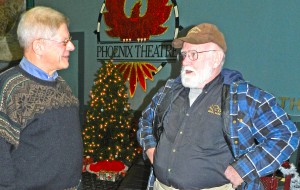BC Conservative Party Leader John Cummins in Fort Nelson
By Kathy Smith
BC Conservative Party Leader John Cummins met with residents at noon yesterday at the Phoenix Theatre to discuss concerns, answer questions, and describe party platforms. Topics included the northern experience (lifestyle), natural resources, taxes, transportation links, access to the Horn River Basin, aging infrastructure/ Fair Share monies, and why Cummins believes the Conservatives have a good chance to succeed in the next provincial election. Acting Mayor Laurie Dolan met with Cummins earlier in the day, and recognized the advantage he has from his experience living in the north; “From his diverse background working in the north and in other parts of the province, this could be the ‘party of choice’ for our future. Mr. Cummins represents his platform on pipelines very well, and stresses the importance of nurturing the progress of our resources. He knows the north and has been around, but doesn’t claim to know everything. He also recognizes the importance for people to have a gathering place such as the Recreation Centre. Overall I had a very positive talk with him,” says Dolan. At the noon discussion, Cummins reiterated, “You need these gathering places for people – people need places to go to and get out – that’s good investment. You need it to attract people, and when people have those sorts of options, their recreational time is going to be spent in a healthy way rather than getting involved in things you don’t want, that are harmful to communities.”
On utilizing the healthy timber this region boasts, Cummins says, “The forest industry has experienced some challenging times; some of them to do with the downturn in the US economy. Now I’m hearing from forestry people that they’re experiencing an increase in demand for timber because of Hurricane Sandy. It didn’t happen with Katrina, but for some reason it is with Sandy … Canadian forest firms are also looking at India and China. It’s a matter of finding export markets and I think government can help industry define the markets – if the markets are there, I’m sure the industry can provide the timber that’s needed…The last thing you want to see is people cutting trees down and the timber going to waste.” On incentives for the oil and gas industry, such as royalties, Cummins responded, “Where the BC government can help, is to offer encouragement for the growth of the industry – whether it’s the Northern Gateway Pipeline going out to Kitimat or Kinder Morgan going to Vancouver, the NDP are opposed to both of them, and the Liberals are sitting on the fence waiting for environmental assessments. We believe the pipelines should be going ahead, and we should be working with the companies on any dangers identified by the environmental assessment. I’ve met with folks from Enbridge and have talked to others in the pipeline industry. I’m confident this can be done safely.” Cummins added that the first job of government is let companies know you are willing to work with them, and though the NDP did have some discussion with Enbridge, he says the Liberals have not; “I don’t know why they won’t even talk to them … these are people willing to make a billion dollar investment in British Columbia; create all sorts of opportunities and on-going tax revenues; they don’t even want to talk to them.”
Cummins sees the difference in taxation between BC and Alberta as a challenge, and says the Carbon Tax is a huge culprit; “They’re paying almost seven cents a litre on fuel they burn in their vehicles – you’re paying it on food and the goods you use in this community from bringing it in by truck. We’re committed to getting rid of the Carbon Tax and the related carbon bureaucracy – we think it’s a disincentive to business, to growth in the north, and a huge addition to the cost of living here.” On the tax base, Cummins feels the first step is getting a handle on spending tax dollars. If done so in a cost effective way, while making sure people get the services they want, it can result in lowered taxes.
Construction of the Centre Line Road linking Fort Nelson to the Horn River Basin has not come to fruition. It offered solutions to several problems; it would eliminate much of the long distance driving required to get to the basin (often in unsafe and time consuming conditions); it would offset the fly-in/fly-out model where workers are parachuted in and out of the basin with no economic benefits to the community, and it would allow ease of transport for local workers and would be an attractant for families to move here and stay here.
Cummins says, “The whole notion of roads to resources – there’s still room for that here … If we’ve got a good transportation network with roads and rail, you’re going to grow the economy, there’s no question about it.” Cummins cited differences between how he sees the northern experience, and how many southerners see it, saying most could not fathom living in the north; “When you look at the northern communities with fly-ins and fly-outs, we have to do something to make people aware of just how livable communities are in here … Government has to educate people about the opportunities available in these northern communities and the lifestyle that goes along with it.”
With the high cost of air travel for Fort Nelson residents, Cummins says, “Reduce the Carbon Tax and that will reduce the cost of transportation. The infrastructure essential for airports is a federal issue, but there has to be an encouragement by the province to ensure opportunities are available to get people in, and move people and goods around in the north … the whole issue of transportation is critical to the development of the north.”
On the topic of not receiving Fair Share monies from the province to assist with infrastructure needs, while other communities receive the funding, Cummins responded, “The interior of BC is where the wealth comes from whether its forestry, mining, oil and gas – it has to come back to them. If you’re going to develop these communities and make these places livable, so you can get from this fly-in/fly-out all the time, you have to make the investment. The government has to make the investment to make sure that happens.”
Cummins says there’s been a tendency for BC voters to vote a party in, not based on support of the party, but to avoid voting another one in. Or, they just don’t vote; “My view is that British Columbians are tired of the options. If you look at the 2009 election, 48 percent of the people stayed home. A lot of people who’ve come to support us are people that; some of them held their nose and voted Liberal last time; there were a lot who stayed home, and some voted NDP last time. The Pollsters tell me that 20 percent of the people who voted Conservative in the 2008 Federal Election, actually voted for the NDP in 2009. These are not NDP’ers – these are people looking for a place to park their boat – they didn’t like the Liberals, they didn’t like what they stood for and they wanted something different.” Adding to his comments on how people are voting related to resource development, Cummins says, “I can’t for the life of me understand why the Provincial Government didn’t allow the mine to go ahead out of Smithers. They killed that about a month ago. We’re in support of those; we need those kinds of good jobs for our young people.”
Comments
2 Responses to BC Conservative Party Leader John Cummins in Fort Nelson
Leave a Reply
You must be logged in to post a comment.


 Follow
Follow



jpalfrey
November 27, 2012 at 11:16 pm
i love this guy!
leahedmunds
November 29, 2012 at 4:02 pm
When’s an NDP leader going to come up???